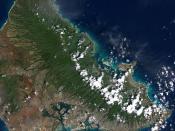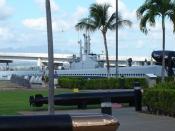The terrorist attacks on September 11th have repeatedly been related to Pearl Harbor. In many ways, the analogy is apparent. Just as that attack initiated us into World War II, the attacks on the World Trade Center and the Pentagon have initiated us into a new kind of war, against terrorism. But starting this sort of borderless war holds great risks, not only to the armed forces commanded to fight but also to core national values. In this way, Pearl Harbor brings other distressing memories, those of the internment.
Similar to the explosions on the East Coast, the bombing of Pearl Harbor on 12-7, devastated our beliefs of national security. How could this have taken place? Average individuals, famous journalists, and government officials soon started criticizing at the Japanese in America. Viewing these "Orientals" as terminally foreign, speaking foreign languages, effect foreign cultures, active foreign religions (Shinto, Buddhism), American society could not differentiate between the Empire of Japan and Americans of Japanese crash.
As General DeWitt, in charge of the Western Defense Command, put it, "A Jap's a Jap." As government reports quickly to the wrapping up that Japanese Americans aided and supported the attack, the wheels of the internment machinery began revolving.
On February 19, 1942, President Franklin Roosevelt issued Executive Order 9066, which approved armed forces in the Western U.S. to issue no matter what orders were essential for national security. Although provoked by DeWitt's threateningly titled "Final Recommendation" for mass internment, the Order suitably made no declaration of race or ethnicity. In March, Congress criminalized insubordination of military rules issued pursuant to the executive order. By December, an well-organized, powerful military had determined nearly all Japanese on the West Coast into ten isolated camps, encircled by barbed wire and armed sentries. All this without the...


